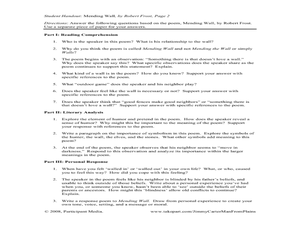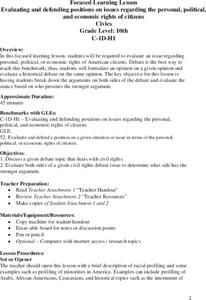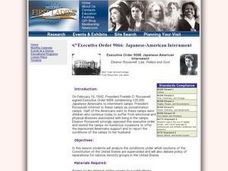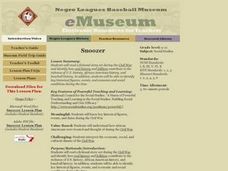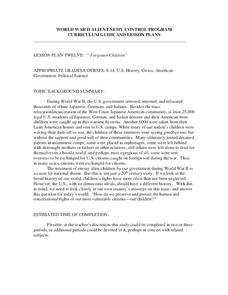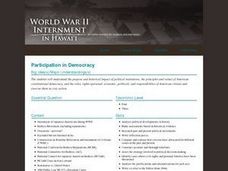Curated OER
C¿¿sar Ch¿¿vez, Organizes the Farm Workers Association - Act I, Scene I "The House Meeting"
Eleventh graders analyze the development of federal civil and voting rights for minority groups. In groups, they discuss how Cesar Chavez organized the farm workers and the techniques he used when protesting. They define and practice...
Facing History and Ourselves
The Legacies of Reconstruction
The final lesson in the seven-resource Reconstruction Era collection examines the legacies of Reconstruction. Class members investigate why the period has been called an "unfinished revolution," "a splendid failure," and "the second...
Curated OER
Priorities and Power: Migrants and Voting
Students examine the African-American migrants entry into the political process. They summarize their findings in a short essay.
Curated OER
Who’s Got Rights? An Introduction to Human Rights and Human Rights Defenders
Pupils explore human rights issues. In this social justice lesson, students examine human rights as they read segments of the "Universal Declaration of Human Rights," discuss photographs with human rights implications, and play a human...
iCivics
Conflict & Cooperation
Considering such conflicts as the Vietnam War and the war in Afghanistan, what motivates nations to cooperate? Your class members will analyze past and current international events in order to understand the types of conditions and...
Curated OER
Abraham Lincoln: Preserving the Union (2 Parts)
Students examine the life and times of Abraham Lincoln. They explore the trials and tribulations of the Civil War, and the problem of slavery that destroyed the Union. They also explore the man behind the image of the 16th president.
Curated OER
Longfellow Amongst His Contemporaries: the Ship of State Dbq
Young scholars evaluate the ship of state metaphor in relation to the historical events in America from the Revolutionary War to the Civil War. They synthesize ideas presented in ten different primary source documents and compose an...
Curated OER
The Eiserloh Story
Students read "The Eiserloh Story" and evaluate decisions made by the government in time of war. They determine if the government violated the rights of innocent civilians. They identify the Bill of Rights and analyze each Right.
Curated OER
Defining Moments From the Past: Japanese American Internment
Learners conduct a mock Congressional Hearing to decide whether or not Japanese Americans who were sent to internment camps during World War II should be provided financial restitution. They research and create a time line of events...
Curated OER
Have Minorities Gained Acceptance
Young scholars cite evidence gathered from magazines about how much Blacks are accepted into the mainstream of American life. They support their conclusions by writing an answer to an essay question.
Curated OER
Lesson Plan: The Black Press
Students examine the history of the black press. In this media awareness lesson, students watch videos and conduct research regarding the history of the black press in America. Students explore media careers as they read provided...
Curated OER
Wall to Peace: Deconstructing Divisions Among People and Cultures
Students analyze quotes and poetry related to relationships in society. For this civics lesson, students participate in small group debate game and focus on communication skills that reinforce civil discussion. Students reflect and...
Curated OER
Focused Learning Lesson
Tenth graders analyze an issue discussing the rights of citizens. They debate after they have formed an opinion and argue the points and evaluate who had the stronger argument.
Curated OER
Civic Oration Topic Planner "A Great Time in American History"
In this report planning worksheet, young scholars prepare to write a 3-5 page report about one great time in American History. Students choose a topic, answer 4 questions to help in planning the report and take this form home for...
National First Ladies' Library
Executive Order 9066: Japanese-American Internment
Students analyze conditions under which sections of United States Constitution are superceded, research history of Native Americans, African Americans, and Japanese Americans, and debate policy of reparations for various minority groups...
Curated OER
Snoozer
Young scholars read a fictional story set during the Civil War and identify how oral history and folklore contribute to the richness of U.S. history, African American history, and baseball history.
Curated OER
Abraham Lincoln and the U.S. Constitution
Students investigate President Abraham Lincoln's use of the U.S. Constitution and its importance to the Civil War. In this US history lesson, students read text about President Lincoln and the US Constitution. Students examine the...
Curated OER
World War II Alien Enemy Control Program
Students become familiar with the concepts of human rights and constitutional rights. They have an increased awareness of the historical record as to the cessation of these rights, especially in regards to children during WWII. It is...
Curated OER
Participating in Democracy
Students analyze film clips in class. In this democracy activity, students identify the differences between civil liberties, democracy and freedom. Students view a video regarding Japanese internment and answer study questions as well as...
National Endowment for the Humanities
Revolution '67, Lesson 1: Protest: Why and How
To some people, protesting is as American as apple pie, but the factors that lead to protests can be as confusing to veteran activists as to today's youth. Revolution '67 explores the riots in Newark, New Jersey as a case study. Using...
University of Arkansas
Promises Denied
"Promises Denied," the second instructional activity in a unit that asks learners to consider the responsibilities individuals have to uphold human rights, looks at documents that illustrate the difficulty the US has had trying to live...
Curated OER
Grab Hands and Run: Understanding Human Rights
Sixth graders read the novel Grab Hands and Run by Frances Temple. They explore the effects of war on human rights. Students explore the idea that human rights are protected by the United Nations. They identify the human rights that were...
State Bar of Texas
Plessy v. Ferguson
Where did separate but equal originate and what does it mean? Scholars investigate the Supreme Court Case Plessy v. Ferguson. Using a short video clip, they analyze the impact the decision of legal segregation had on society in 1896....
State Bar of Texas
Sweatt v. Painter
Is separate but equal actually equal? The 1950 Supreme Court case Sweatt v. Painter discusses the law of segregation and inequality. Scholars investigate the impact of the case on the desegregation of public schools across the nation...













